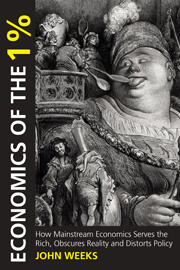Book contents
- Frontmatter
- Dedication
- Contents
- Preface: Doctor Bob's Third Law
- Introduction: Economic Ignorance
- Chapter 1 Fakeconomics and Economics
- Chapter 2 Market Worship
- Chapter 3 Finance and Criminality
- Chapter 4 Selling Market Myths
- Chapter 5 Riches, “Sovereignty” and “Free Trade”
- Chapter 6 Lies about Government
- Chapter 7 Deficit Disorders and Debt Delirium
- Chapter 8 Governments Cause Inflation?
- Chapter 9 Institutionalized Misery: Austerity in Practice
- Chapter 10 Economics of the 99%
- Notes
- Index
Chapter 5 - Riches, “Sovereignty” and “Free Trade”
Published online by Cambridge University Press: 05 April 2014
- Frontmatter
- Dedication
- Contents
- Preface: Doctor Bob's Third Law
- Introduction: Economic Ignorance
- Chapter 1 Fakeconomics and Economics
- Chapter 2 Market Worship
- Chapter 3 Finance and Criminality
- Chapter 4 Selling Market Myths
- Chapter 5 Riches, “Sovereignty” and “Free Trade”
- Chapter 6 Lies about Government
- Chapter 7 Deficit Disorders and Debt Delirium
- Chapter 8 Governments Cause Inflation?
- Chapter 9 Institutionalized Misery: Austerity in Practice
- Chapter 10 Economics of the 99%
- Notes
- Index
Summary
Even You Can Be Rich
I tell you the truth, it is hard for a rich man to enter the kingdom of heaven. Again I tell you, it is easier for a camel to go through the eye of a needle than for a rich man to enter the kingdom of God.
(Matthew 19:23–4 It is obvious that Matthew never took a course in fakeconomics)Two elderly women are at a Catskill mountain resort, and one of 'em says, “Boy, the food at this place is really terrible.” The other one says, “Yeah, I know; and such small portions.”
(Woody Allen)For all its failings, supporters of an unregulated markets system believe it has one great saving grace. This virtue trumps all its sins. In an unregulated market economy anyone can become rich if he or she has the necessary drive, commitment and optimism. Government interference through taxes and regulations on market behavior rob people of the opportunity to be graced with that reward for diligence, prudence and enterprise.
Of course, everyone cannot be rich. The fakeconomics myth is not that simplistic and naïve. The shining path offered, what might be called the Sendero Luminoso of the econfakers, recognizes that only a few can, but anyone, even you, could be among the few. This fable teaches that accession by the few is not a lottery, but the direct result of individual effort. In a sentence: If you want it, go for it, and you'll get it unless the government stops you through its socialist meddling.
- Type
- Chapter
- Information
- Economics of the 1%How Mainstream Economics Serves the Rich, Obscures Reality and Distorts Policy, pp. 81 - 106Publisher: Anthem PressPrint publication year: 2014



